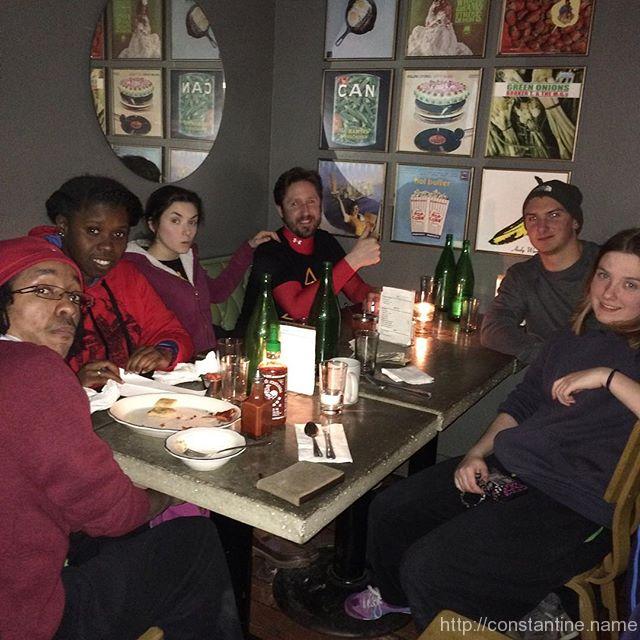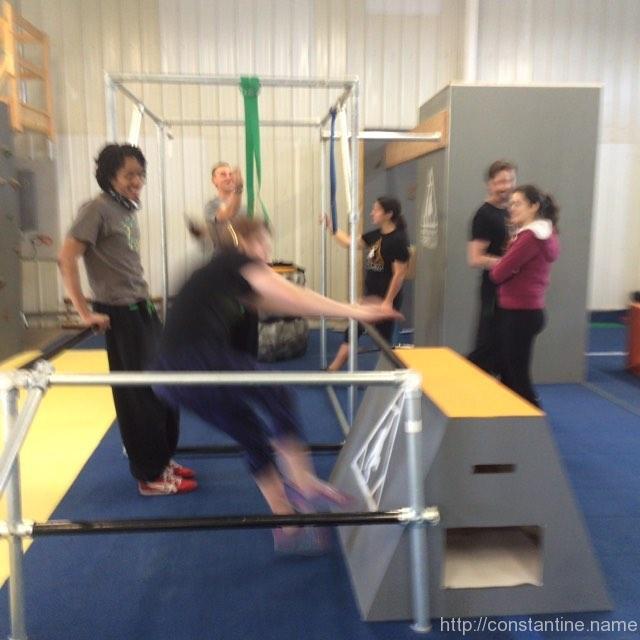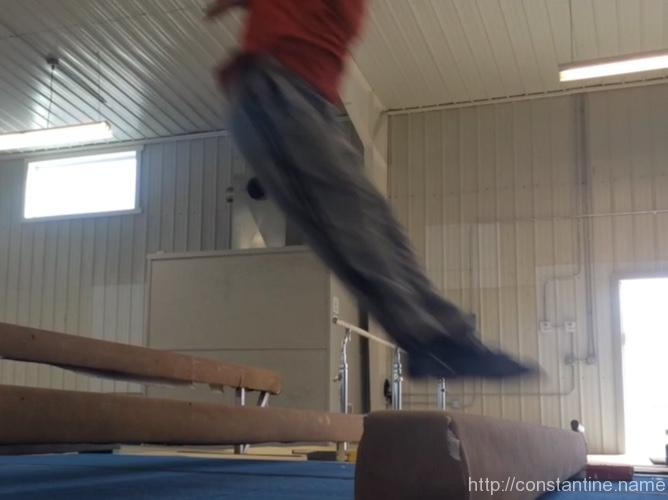I’m not saying that you have to be a reader to save your soul in the modern world. I’m saying it helps.
~ Walter Mosley
slip:4a1528.
I’m not saying that you have to be a reader to save your soul in the modern world. I’m saying it helps.
~ Walter Mosley
slip:4a1528.
What role do emotions and energy play in creating meaningful connections and achieving success in podcasting and life?
Matt Phelan joins Craig Constantine to explain how he manages to measure happiness without making it a pointless metric and to reveal the profound impact of podcasting on personal connections in the world of employee happiness research.
For 10 years I ran a marketing agency, I know how the world works and getting big names on your podcast is really good […] But then I have to remind myself: The whole point of the podcast, for me, was the discovery of really interesting people […]
~ Matt Phelan, 10:05
Matt Phelan and Craig Constantine lean into podcasting, happiness measurement, and the authenticity of dialogues. Their conversation evolves into a reflection on personal and professional paths, transcending the mechanics of podcasting to highlight the emotional bonds it can create.
Matt shares his experience with his podcast, “Happiness and Humans,” stressing the critical view that happiness shouldn’t be reduced to a quantifiable metric, as it risks losing its essence. He reflects on his decade-long journey, concluding that failing to align himself with the natural energy flow resulted in significant time lost on unfruitful endeavors. This insight shapes a broader conversation about the importance of surrendering to the flow, influencing his life philosophy and his approach to the podcast.
Further, Matt explains his decision to spotlight insightful, yet possibly overlooked, stories and research over pursuing notable figures, thereby staying true to his podcast’s aim to uncover novel perspectives on employee happiness and well-being.
Takeaways
The importance of authenticity in podcasting — focusing on meaningful conversations rather than chasing high-profile guests enhances the value of the content.
The futility of rigid metrics for happiness — emphasizing that once happiness becomes a target, it loses its significance as a genuine metric.
Following the natural flow — a decade-long reflection revealed the inefficiency of going against the natural current, underscoring the importance of energy alignment in personal and professional endeavors.
Highlighting lesser-known research — choosing to feature insightful stories and research from individuals who may not be widely recognized can uncover unique perspectives on topics like employee happiness.
Emotional connections through podcasting — conversations that dive into personal feelings and experiences can create stronger, more meaningful connections with the audience.
Challenging conventional success metrics in podcasting — success can be more authentically measured by the impact on individuals and the personal connections formed, rather than just viewership or listener counts.
The transformative power of self-reflection — reviewing past actions and decisions, such as the allocation of time and energy, can lead to more effective and fulfilling future endeavors.
Resources
Happiness and Humans — Matt Phelan’s podcast exploring themes around happiness in the workplace, featuring insights from various professionals and researchers.
The Happiness Index — Matt’s book, discussed in this episode.
The Happiness Index — A platform and company founded by Matt and his partners, offering tools and services to measure employee engagement and happiness.
https://www.linkedin.com/in/matthewphelan/ — Matt on LinkedIn
Freedom to Be Happy — Matt’s first, self-published book based on insights and data gathered from measuring employee happiness in over a hundred countries.
(Written with help from Chat-GPT.)
ɕ
We can set our deeds to the music of a grateful heart, and seek to round our lives into a hymn—the melody of which will be recognized by all who come in contact with us, and the power of which shall not be evanescent, like the voice of the singer, but perennial, like the music of the spheres.
~ William Mackergo Taylor
slip:4a1381.
Reading time: About 6 minutes, 1300 words
Get 7 for Sunday in your inbox. → Subscribe here.
This issue is https://7forsunday.com/22
When we have a bit of time to relax, we tend to spend time on activities that provide us with a quick dopamine hit. This is especially the case when we spend our downtime in the digital world. The key to relaxation is to invest in strategies that make your mind less stimulated. Usually this means spending more time in the analog world.
~ Chris Bailey from, The Key to Relaxation
slip:4ucite1.
That analog world can be outside moving or inside doing some yoga, sipping coffee, reading, or spending time with people physically present. The more time I can spend in the analog world, the better my life is.
I have a lot of hard-learned knowledge around what works for me in the morning, and I urge you to experiment to find out what works for you. For years I’ve been using the word “surfacing” to refer to that moment when I transition from simply being myself, to engaging with the world through technology. Surfacing is a submarine reference; Like a submarine, at some point each morning—sometimes after Noon—I sneak up to periscope depth and without making a ripple on the surface I peek to see what in the world might be close at hand. I know that once I break the surface, my life that day changes. One moment, I’m out of sight being self-directed (not necessarily selfish, but rather directing myself) and the next moment there’s an endless world vying for my attention.
My point is not that there’s something wrong with the world. (There is, but that’s not my point.) My point is that the world is simply present. It is ever-present. It’s not the world’s responsibility to not bother me. It is my responsibility to choose. I must choose when to engage and when to be the void. I must choose how to be present for those to whom I am beholden, and I must choose to not waste my energies on everything else. Because there is literally an infinite amount of everything else and chasing that is a fool’s errand.
ɕ
There are no radical creative choices that do not carry with them an inherent risk of equally radical failure. You cannot do anything great without aggressively courting your own limits and the limits of your ideas. […] There is nothing more powerful than failure to reveal to you what you are truly capable of. Avoiding risk of failure means avoiding transcendent creative leaps forward. You can’t have one without the other.
~ Aisha Tyler
slip:4a783.
There are no radical creative choices that do not carry with them an inherent risk of equally radical failure. You cannot do anything great without aggressively courting your own limits and the limits of your ideas. […] There is nothing more powerful than failure to reveal to you what you are truly capable of. Avoiding risk of failure means avoiding transcendent creative leaps forward. You can’t have one without the other.
~ Aisha Tyler
slip:4a783.
Sometimes it’s a single word that makes me pull a quote. In this case it was that “aggressively”.
There are times, in certain situations, where aggression is what’s called for. I’m often reflecting and journaling about how I need to temper my, well, everything. Moderate my ego. Moderate my thoughts. (“The snow globe that is my mind,” as I often put it.) Moderate my activity. Moderate my assault on grammar, even. But there are times when the right course of action is to start getting shit done, taking down names, and delivering letters to Garcia. (And, yes, I’m aware that the whole thing about delivery of a letter from President McKinley to Gernal Garcia is false, but the point of the essay is still patently clear and useful.)
Until I’d read that quote from Tyler, I’d never really thought about “aggressively” courting my own limits. Courting them, sure. But not aggressively.
So, yeah… come at me ‘bro!
ɕ
I owe a large debt to Leo Babauta of Zen Habits for the tremendous number of tremendously useful posts I’ve had the pleasure of noodling over. One way I try to pay back people who’ve been kind enough to create positive things sprinkled around the Internet is simply to point as many people as I can towards said things. If you’d like to try a large dose of—what I lovingly refer to as—Leo-zen, try his free ebook, The One Skill.
ɕ
slip:2oe3.
Which I guess is what the paradox resolves into: a devaluing of superficial pleasures and a greater appreciation for simple, authentic ones. I don’t really enjoy the presents at Christmas anymore, the fireworks at Fourth of July, or even the parties on New Year’s Eve. I’ve seen bigger parties, been to more beautiful places, and already own everything I’ll ever want in this life. But unlike before, I appreciate every day spent with those who mean a lot to me. A quiet beer on a patio. Watching a basketball game together. Going to a birthday party or a barbecue. These are the events I look forward to now and get excited about, days and weeks ahead of time… And that’s probably the way it should be.
slip:4umajo1.
I really have seen bigger parties, been to more beautiful places, and already own everything I’ll ever want in this life.
The comparison I’m making is not with you. The sentence above does not contain the phrase, “than you have.”
The comparison I am making is to this moment… to this experience. There’s a reason I choose to share this moment with you. Not this exact moment as you’re reading; we’re not sharing this moment as you’re reading. I’m taking about moments in real life that we experience together, if any. There’s a reason I’m choosing to experience those moments.
Enough about me. How do you choose— …actually, wait…
Do you choose how to spend your moments?
ɕ
Theoretically, if you know what you love, then every time you make a decision you’ll have a pretty damn clear idea if it’s taking you closer or further away from what you love. You’ll know the right thing to do. So self-love is a moral issue. It consists of doing the right thing, and nothing else.
slip:4urawy1.
Ouch.
If you put it that way, that would mean that all of my problems are my responsibility. There is, after all, nothing in my power beyond my reasoned choices.
Nothing.
ɕ
One of the functions of art is to give people the words to know their own experience. There are always areas of vast silence in any culture, and part of an artist’s job is to go into those areas and come back from the silence with something to say. It’s one reason why we read poetry, because poets can give us the words we need. When we read good poetry, we often say, ‘Yeah, that’s it. That’s how I feel.’
~ Ursula K. Le Guin from, Ursula K. Le Guin on Art, Storytelling, and the Power of Language to Transform and Redeem
slip:4ubauu1.
In the beginning, I watched 2001: A Space Odyssey — no, I’m not old enough to have seen it in the theater, thank you — and, in all honesty, I did not understand most of it. Later, I learned about the story, read the related books, etc.. I rewatched the movie and began a long period of wielding my understanding as a badge of pride. (“I understand 2001! Here, let me show it to you. Let me explain it to you.”) I eventually went on to learn to play the Blue Danube on the piano because the piece is so prominent and moving in the film.
… cross-fade …
Very recently, I saw a solar eclipse and I wished someone had queued up Also sprach Zarathustra — whose introduction, by the way, still gives me shivers. It would have been sublime to have had totality begin just as the creshendo strikes in the opening . . .
I digress.
Also sprach Zarathustra is a tone poem and after the eclipse — perhaps in search of that sublime moment missed — I took the time to listen to it in its entirety.
…and that led me to adjust my living room for optimal viewing
…to crank up the volume
…and to cue up 2001.
It was just as awe-inspiring as I recalled. Just as awe-inspiring as I’d hoped.
…and then I read this piece — from the perennianlly stellar Brain Pickings — about le Guin’s conception of art.
Something clicked and I gained a new appreciation for the film: “Yeah, that’s it. That’s how I feel.”
ɕ

*burp* Oh that was delicios! Post traing at the Innate’s gym and then outdoors at SUNY in New Paltz. Awesome day with friends!
ɕ

Post intro event playing. What happens when you have ten ppl and toys…
ɕ

Fun with controlled precisions: I finally got around letting the camera run while repeating a jump. Here’s two that I was working on yesterday. These were just a wee bit odd for me to sort out. This is the aspect of indoor gyms that I love; being able to set up something very specific. This was taken at Innate Movement Parkour -Kingston, NY.
ɕ
A group of scientists from multiple institutions looked at a number of other reasons that we could be in the midst of an obesity epidemic that have nothing to do with diet and exercise, or as they call them, the Big Two. They make the case in an paper published online in advance of print in the International Journal of Obesity that so many have so fully accepted the Big Two that pretty much no one has bothered to look for any other causes.
~ Michael Eades from, «http://www.proteinpower.com/drmike/weight-loss/how-does-life-fat-thee-let-me-count-the-ways/»
ɕ

Slow going this morning, but at least the traffic is light — or should I say “white.” #freshTracks
ɕ
When one considers it is really only a short, round stick of wood, it is even more intriguing to ponder what an elemental gap the hardwood jo has filled in the history and evolution of the martial disciplines of Japan…
slip:4ukoli1.
There are also some apropos comments on weapons by Kanai Sensei in Aikido News issue 36:
[O-Sensei] would throw the uchideshi, (live-in disciples), with very little in the way of explanation and we would grasp what we could of the feeling of the technique while we were flying through the air…
~ Aikido Journal from, Interview with Mitsunari Kanai Sensei
ɕ